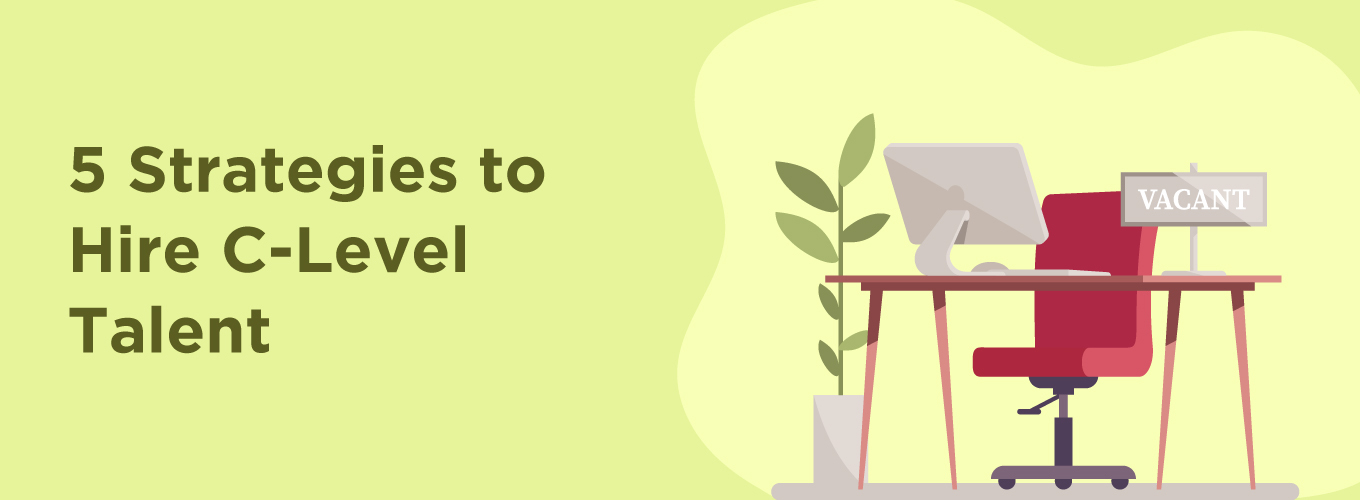5 Strategies to Hire C-Level Talent
Leadership roles in companies are often difficult to fill. These are roles where the best of talent is required. They must bring sharp business acumen, sound values, aggressive and ethical decision-making skills and a people-centric approach – for shareholders, employees and customers – to their roles. This is why finding business leaders that fit a company’s vision, culture and growth strategy is quite challenging.
Table of Contents
Who are C-level professionals
The senior leadership is called C-level or C-Suite professionals in the corporate hierarchy. These are people who have the word “chief” attached to their title. This includes the chief executive officer, chief operating officer, chief financial officer, chief technology officer, chief human resources officer, chief procurement officer, chief sales officer and chief marketing officer.
Recruitment strategy for the C-level
A company must clearly spell out its non-negotiables. Which is, what values will a company never compromise on while pursuing its business strategy. A simple recruitment strategy for C-level professionals is to find candidates whose values match those of the company. Of course, academic qualifications and experience are a given. But at the C-level, a value mismatch between the candidate and the company can prove very costly. This is because, by the nature of their role and seniority, C-level executives are expected to lead by example. For instance, you cannot have a CEO who lacks integrity leading a financial institution that prides itself to be transparent and ethical.
So, a simple recruitment strategy for the C-level is, beyond qualifications and experience, to hire for values and culture fit within the organization
Clearly define what needs to get done
Most C-level executives thrive when they know clearly what they are setting out to accomplish. Remember that these are people who have been there, done that. They are extremely talented. And they have several achievements to their credit. What they are looking for when they are considering making a move is a new challenge. So, when they are being recruited, it will really work better for the company and the candidate to clearly understand what needs to get done.
A clear mandate always gets the best out of good leaders.
Look within before looking to hire from outside
When you are looking to fill a C-level role, explore the opportunity to promote an internal candidate. They will know the culture of your company well. And they will also understand the company’s policies, priorities and performance goals best. Having someone with the right culture fit is key to leadership in a C-suite role. However, if you must hire from outside your company, as discussed before, do ensure you are bringing on board someone whose values are in sync with your company’s values.
Also Read: 3 Illustrations Of Incredible Leadership
Hire to suit your company’s operations
While there may be a temptation to bring a top-performer from a large company so that you can scale up your company faster, please know that this move often backfires. Large companies have different processes and policies. The manpower available in such companies are also significantly different in terms of skills and numbers. A business leader in a large company, therefore, typically has a lot more resources available at their disposal to achieve results. When they come into a smaller company, often an entrepreneurial venture, they demand the same kind of resources. And when these are not readily available the leaders are unable to deliver.
So, quite often, top performers in large companies fail to deliver in smaller ones. The experiment is an expensive one for the small company because they have burnt significant financial resources to recruit this top C-suite executive.
Involve more people in the hiring process
It may not be your intention to want to delay a C-level appointment. And so you may not want to have too many people involved in the hiring process. But it always works well when you have experienced members of your board or from your extended business family (if you run a family enterprise) meet potential candidates. People interviewing for C-level roles are very good at presenting themselves. They are also very talented. And highly confident and accomplished. So, they are likely to make a good impression instantaneously. It requires people with great conversation skills to explore a candidate’s life and career journey in full, thoroughly, to be able to flag off concerns. The concern may not always be skill-related. It may often have to do with values and with being a fit in your company’s culture. This opinion, when it is received in the recruitment stage, can save everyone time and save the system a lot of pain.
Also Read: Cracking the Leadership Role
Review the candidate’s references and social media presence
This is again a process that could be time-consuming. But this is a real saver when it comes to preventing a bad hire. Talk to as many former employers and senior colleagues of the candidate as possible. Deep dive into the candidate’s social media profiles. Explore their comments and opinions on all subjects. You will either find information that is validating your own views of the candidate or you may find fresh information that presents a different side of the candidate. Either way this information is invaluable. Use it to discuss the person’s candidature with your recruitment panel and to take an informed decision.
Look for 21st century traits
In addition to values being in sync, in addition to the right qualifications and experience, look how relevant the candidate’s skill sets and attitude are in today’s world. A typical C-suite recruit may be with your company or in the corporate sector for the next 20 years. So, they need to have a few 21st century traits:
- They must be tech-savvy. They must have embraced the digital era’s new technologies seamlessly.
- They must be agile. They must be willing to move quickly on decisions and even around the world.
- They must have the hunger to learn from the new generation. You don’t want someone who thinks they know everything. While a business leader brings oodles of experience, they must also have the willingness to learn from millennials and Gen Z professionals.
In conclusion
Really, having said all of that, look for people with a big heart. Look for people with empathy. And look for people with enthusiasm. None of these traits can be taught. They are inborn. And people with these traits make the best C-suite leaders!
Visit Xpheno, our website, to find job opportunities in C-Level positions. We are a staffing firm that aims to organize opportunities for skilled and unskilled Indian talent. We have been aiding the scaling journey of high-growth sectors like Fintech, Agritech, Edtech, Logistics, Pharma and D2C in India.









